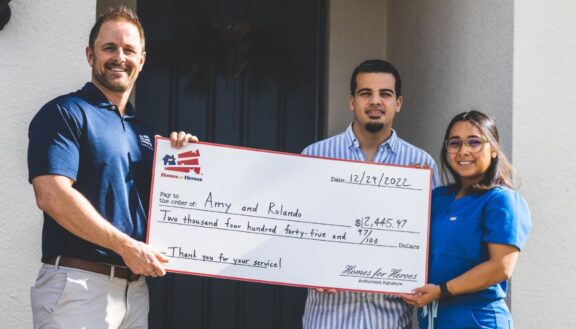
FHA loans for nurses are a powerful homebuying tool, offering flexible credit requirements and low down payments that align with the unique financial realities of nursing careers. Whether you’re navigating student loan debt, variable income from shift work, or the demands of travel nursing, FHA financing can help you step into homeownership with less road blocks. In this guide, you’ll learn how FHA loans work, why they’re especially nurse-friendly, and how to stack them with exclusive savings programs like Homes for Heroes to maximize your benefits.
Table of Contents:
- What is an FHA Loan?
- Must-Knows About FHA Loans for Nurses
- Pros & Cons: FHA Loans for Nurses vs Conventional Loans
- Stack an FHA Loan with Homes for Heroes Savings
- Averaging Travel Nurse Income for FHA Loans
- Busy Nurse’s Documentation Preparation Checklist
- Frequently Asked Questions
- Take Action – Your Next Steps
Key Takeaways:
- FHA loans for nurses offer a low down payment option (as low as 3.5%) and more flexible credit requirements, making homeownership more accessible, even with student debt or irregular income.
- Your income as a nurse, including overtime and variable shifts, can be averaged over 24 months to help qualify for an FHA mortgage. This includes travel nurses.
- FHA loans are assumable, which can make your home more attractive to future buyers, especially if interest rates increase.
- You can use 100% gift funds for your down payment, which is helpful for nurses with limited savings.
- Combining an FHA loan with Homes for Heroes can save a nurse an average of $3,000 on a home purchase, and $6,000 if you buy and sell. Sign up to speak with our local specialist today and find out more.
What is an FHA Loan?
An FHA loan is a mortgage backed by the Federal Housing Administration. It was designed to improve the possibility of homeownership for would-be borrowers who might not qualify for a conventional mortgage.
Since 1934 these government-insured loans have helped millions of Americans, including many nurses and healthcare workers, purchase homes with more flexible qualification requirements.
Key FHA Loan Features that Benefit Nurses:
- Low down payment requirement – As low as 3.5% of the home’s purchase price.
- Flexible credit standards – Credit scores as low as 580 may qualify for the lowest down payment option of 3.5%. Some mortgage lenders will allow credit scores as low as 500 with a minimum down payment of 10% if the borrower meets the lender’s requirements. However, to be completely transparent, borrowers with a credit score below 580 are not commonly approved for an FHA mortgage. But, it is worth knowing it can happen under the right circumstances.
- Government backing – FHA insurance helps to protect lenders from some of the risk, which allows lenders to allow more lenient underwriting, and this gives you a better chance of your loan getting approved.
- Assumable loans – Future buyers can take over (assume) your FHA mortgage, which may potentially make your home more attractive when selling.
- Gift fund acceptance – 100% of your down payment can come from family gifts with proper documentation.
For nurses balancing demanding schedules, potentially making student loan payments, and the financial realities of healthcare careers, FHA loans provide a legitimate option to qualify for a mortgage and purchase the home you want.
Must-Knows About FHA Loans for Nurses

The FHA loan has certain standards and requirements that are helpful for nurses and healthcare professionals to know when looking to purchase your first or next home.
Income and Employment Standards:
- Two-year work history – Two years is the standard, but it can be with multiple employers in the healthcare field. Some lenders will accept less than two years under the right circumstances and whether the proper paperwork is available.
- Debt-to-income (DTI) ratio – Typically 43% is the maximum DTI lenders will allow, and it would include all recurring debts.
- Variable income accommodation – Lenders may average the past two years’ income for nurses with irregular schedules or overtime pay.
Property Requirements:
- The home you purchase with your FHA loan must be your primary residence.
- The home or property must meet FHA safety and habitability standards.
- FHA loans may not be used on investment properties or vacation homes.
These requirements recognize that nurses often have strong employment prospects and stable career paths, even if their credit history isn’t perfect or their savings are limited due to student loan obligations.
Pros & Cons: FHA Loans vs Conventional Loans for Nurses
Understanding the trade-offs between FHA and conventional financing helps nurses make informed decisions based on their specific financial situation and long-term goals.
| FEATURE | FHA LOAN | CONVENTIONAL LOAN |
| Minimum Credit Score | 580 (3.5% down) 500 (10% down) | 620 or higher (620 minimum is not universal, and will depend on lender) |
| Down Payment | 3.5% – 10% | 3% – 20% |
| Mortgage Insurance Premium (MIP) | Required for loan life. Amount determined by factors such as loan term and down payment amount. | PMI required if down payment < 20%, but removable once equity reached. PMI not required if down payment is 20% or more |
| Debt-to-Income (DTI) Ratio | Up to 43% (standard max) | Up to 36% (standard max) |
| Closing Costs: Seller Concessions Limit | Up to 6% allowed | Up to 3% (<10% down payment) Up to 6% (10-25% down payment) Up to 9% (25%+ down payment) On primary residence or 2nd home only. |
| Loan Assumability | Yes – future buyers can assume | No |
| Upfront Mortgage Insurance | Required: 1.75% of loan amount (can be rolled into loan) | Not required |
Advantages of FHA Loans for Nurses:
- Lower barrier to entry – More accessible for first time home buyer nurses.
- Flexible credit requirements – Better chance to accommodate past financial challenges.
- Predictable costs – Fixed mortgage insurance makes budgeting easier.
Advantages of a Conventional Loan:
- Lower long-term costs – No permanent mortgage insurance
- Higher loan limits – Better for expensive housing markets near major medical centers
- Potentially lower rates – For borrowers with excellent credit
Best Choice for Nurses:
- Choose FHA – If you’re a first time home buyer nurse, have credit challenges or limited savings.
- Choose conventional – If you have strong credit (740+) and can receive better rates, substantial savings readily available for down payment, or are buying in a high-cost area where FHA limits are restrictive.
We offer more information about additional home loans for nurses if you wish to learn more about your options.
Stack an FHA Loan with Homes for Heroes Savings

One of the most effective strategies for nurses is combining FHA financing with Homes for Heroes benefits, creating a powerful combination that addresses both accessibility and affordability concerns.
Homes for Heroes Nurse Benefits
When you work with our local real estate and mortgage specialists to close on your new home or mortgage, you can receive the following benefits:
- Agent savings – Average savings is $2,300. You receive your savings in the form of a Hero Rewards check after closing on your home purchase. You receive 0.7% or $700 on every $100,000 of the home’s purchase price.
- Lender savings – Average $500 savings on lender fees.
- Title savings – Average $150 savings on title fees.
- Home inspection savings – Average $50 savings on a home inspection
- Local experts – Our local specialists understand nurse schedules and potential income inconsistencies. They have expert knowledge of the local market, and specialize in saving you money on your next home purchase or mortgage refinance.
Take Advantage of Special Tools and Insights:
- Estimate the savings you would receive if you purchased a home with Homes for Heroes and our local specialists.
- Estimate your monthly mortgage payment to better understand how much home you can afford to purchase and successfully make your monthly payments.
- Find out current mortgage rate estimates for select loan types.
Sign up today to speak with your local Homes for Heroes mortgage and/or real estate professionals to find out more about how Homes for Heroes can serve your needs and save you money in the process.
Averaging Travel Nurse Income for FHA Loans

Travel nurses can apply for any mortgage, including FHA loans, but they do face unique challenges due to the contract-based employment structure of their job and the potential for different income streams.
However, FHA guidelines specifically accommodate travel nurses by allowing income averaging over 24 months. This typically does require two years of documented employment in nursing.
Documentation Requirements for Travel Nurses:
Essential paperwork:
- Compensation agreements for the previous two years
- All W-2s from the past two years
- Employment verification letters from agencies
- All year-to-date pay stubs from each employer up to application time
- Any current and/or future contract agreements in place
Income calculation process:
- 24-month averaging – Lenders average your total income over the past two years
- Contract gaps – Brief periods between assignments are typically acceptable
- Taxable vs. non-taxable – Per diem and non-taxable reimbursements usually don’t count toward qualifying income
- Overtime and differentials – Night shift and/or weekend premiums are typically included in income calculations
Strengthening your application:
- Be sure to maintain detailed records of all contracts and assignments
- Obtain letters from agencies confirming ongoing relationships
- Document any extended or renewed contracts
The key to a successful mortgage application and approval process as a travel nurse is thorough documentation, demonstrating the stability and consistency of your nursing career; even if your geographic location and employers change.
Busy Nurse’s Documentation Preparation Checklist

Having your FHA loan documentation prepped is important for busy nurses, especially those working night shifts, weekends, or rotating schedules. This organized approach can help streamline the application process and reduce potential stress for a busy nurse.
Essentials (scan hard copies, organize into digital files)
Income verification:
- Last 30 days of pay stubs (capture all shifts, overtime, differentials)
- Previous two years of W-2 forms
- Federal tax returns for past two years
- Employment verification letter from HR or supervisor (may or may not be required)
- For travel nurses – All contracts and assignment letters from past 24 months
Financial documentation:
- Bank statements from past 2-3 months (all accounts, depends on lender requirements)
- Investment account statements if applicable (401k, Roth IRA, etc)
- Credit report (get a free credit report to review, so you can address any issues before applying)
- Student loan statements and payment history
- Any other debt obligations (car loans, credit cards, etc)
Personal identification:
- Government-issued photo ID
- Social Security card or tax documents with full social security number (SSN)
- Documentation of any name changes
Property-related (once under contract):
- Purchase agreement
- Property insurance quotes
- Home Owners Association (HOA) documents if applicable
Your lender will likely provide you with all they require for each step in the loan process. This list provides the typical essentials and gives you a good head start in your preparations.
If you prefer to speak with our local lender before assembling all of your documents, simply sign up on our site and we will let our local lender know to contact you.
Frequently Asked Questions

Q: FHA loans for nurses require what credit score this year?
The house you are taking a loan out for also has to meet strict health and safety standards. This is to ensure that the house will not become condemned, possibly forcing you to default on your loan. You will need to do an inspection on your potential house to show to your mortgage lender and the FHA that the house is not in danger of any hazards.
Q: Can travel nurses qualify for FHA loans with variable income?
A: Yes, FHA guidelines specifically accommodate travel nurses through 24-month income averaging. Lenders will typically require at least two years of documented employment in nursing and will average your total earnings to establish a qualifying income figure. Your consistent documentation of contracts and assignments is key.
Q: How much can nurses save by combining FHA loans with Homes for Heroes?
A: Nurses typically receive an average of $3,000 savings when they buy a home with local Homes for Heroes mortgage and real estate specialists. The combination creates significant savings beyond the benefits offered through FHA loans for nurses alone.
Q: Are FHA loans assumable, and why does this matter for nurses?
A: Yes, FHA loans are assumable, meaning future buyers can take over your mortgage terms. This can be valuable when selling, especially if you secured a low interest rate. It’s particularly beneficial for nurses who may relocate for career opportunities.
Q: Do FHA loans require mortgage insurance, and how does this affect monthly payments?
A: Yes, FHA loans require mortgage insurance premiums (MIP) for the life of the loan. While this increases monthly payments compared to conventional loans without Private Mortgage Insurance (PMI), it does allow for you to pay a low down payment that makes homeownership much more doable; especially for first time home buyer nurses who may not have much money saved for a down payment.
Q: Can I use gift money for my FHA down payment as a nurse?
A: Yes. FHA guidelines allow 100% of your down payment to come from gift funds from family members or other approved sources, with proper documentation. This is particularly helpful for nurses managing student loan payments who may have limited savings.
Q: What makes FHA loans better for nurses than other mortgage options?
A: FHA loans offer the ideal combination of accessibility and flexibility that matches nursing career realities:
- Lower credit requirements
- Minimal down payments
- Accommodation for shift work income patterns
- Ability to handle student debt obligations while still qualifying for homeownership
Take Action – Your Next Steps
Immediate Action Steps:
- Check your credit score and review your credit report for any issues that need addressing
- Calculate your budget using the 43% debt-to-income ratio guideline, including all current obligations
- Gather your documentation using the Documentation Preparation Checklist to streamline the application process
- Sign up with Homes for Heroes to speak with their local specialists about stacking the benefits they provide, along with the benefits provided by FHA loans for nurses.
Long-Term Planning Considerations:
- Location strategy – Consider proximity to major medical centers and future career opportunities
- Market timing – FHA loans don’t require perfect market timing due to their accessibility
- Career growth – Factor in nursing career advancement and potential income increases
- Lifestyle needs – Choose homes that accommodate your shift work and personal life balance
The combination of FHA loan accessibility and specialized programs like Homes for Heroes creates unprecedented opportunities for nurses to achieve homeownership. Your dedication to caring for others deserves a stable, comfortable home base where you can rest and recharge between shifts.
Ready to Start Your Journey to Homeownership?
Sign up with Homes for Heroes today and our local mortgage specialist will contact you. They understand nursing careers and can guide you through the FHA loan or any other loan process efficiently and effectively, and help you receive significant savings when you close.
Estimate Your Savings
Learn how much you could save on your home purchase. Adjust the slider to see potential savings when you buy with a Homes for Heroes real estate and mortgage specialist. This is an estimate. Your actual savings may vary.